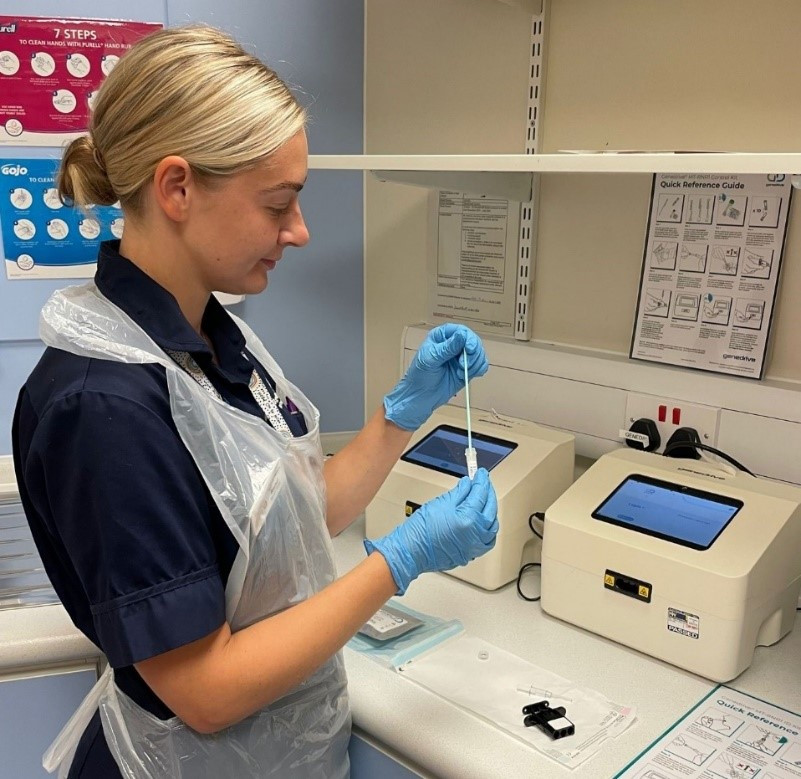
An innovative genetic test that can help prevent newborn babies from going deaf if treated with a common antibiotic, based on the work of University of Manchester and Manchester University NHS Foundation Trust (MFT) researchers, is now being used in routine clinical practice in maternity settings at MFT.
Using a simple cheek swab, the test can identify in 26 minutes whether a critically ill baby admitted to intensive care has a gene change that could result in permanent hearing loss if they are treated with a common emergency antibiotic, Gentamicin.
The test, developed by Manchester researchers was first piloted at Saint Mary’s Hospital and Liverpool Women’s Hospital in 2021.
Following its success, the test was implemented into routine clinical practice Saint Mary’s Hospital in 2022, which has now been extended to North Manchester General Hospital (NMGH) and Wythenshawe Hospital, part of Saint Mary’s Managed Clinical Service at MFT in July 2023.
It is estimated that approximately 1,700 babies a year will be tested at MFT, which has so far saved the hearing loss of six babies in Greater Manchester since the pilot in 2021 through to the implementation of the test in 2022.
This introduction follows the conditional recommendation of the test by the National Institute for Health and Care Excellence (NICE), earlier this year.
Dr Ajit Mahaveer, Consultant Neonatologist at Saint Mary’s Hospital, was involved in the initial research and has led the rollout across MFT. He said: “Since its introduction at Saint May’s Hospital in October last year, over 600 babies have been tested. Three babies tested positive for the gene change that would cause them to go deaf if given Gentamicin and were successfully given an alternative antibiotic within the NICE recommended ‘golden hour’.”
While Gentamicin is used to safely treat approximately 100,000 babies a year, one in 500 babies carry the gene change that can lead to permanent hearing loss when given the drug.
Dr Mahaveer continued: “As a doctor dealing daily with infection, it is important that we do not delay antibiotic treatment. The new swab test technique replaces a test that traditionally took several days and is the first use of a rapid point of care genetic test in acute neonatal care. It is fantastic to be involved with the rollout of the test across MFT hospitals, which will ensure even more babies do not lose their hearing for a preventable reason.”
Approximately 350 nurses have been trained to use the genetic testing machine across MFT at Saint Mary’s Hospital, Wythenshawe Hospital, and NMGH.
Rachel Parkinson, Senior Sister, Neonatal Unit, North Manchester General Hospital, said: “Babies can deteriorate so quickly that giving them antibiotics for proven or suspected infection is an absolute priority to ensure the best possible outcome. It is fantastic that in these situations we can now test quickly and easily for this gene change, day or night.
“It is also further reassuring to know that this result could not only have an immediate impact on their lives, but it could also ensure those babies with the genetic variant can further avoid treatment with Gentamicin over their lifetime.”
Dr Mahaveer concluded: “This straightforward non-invasive test is the future of individualised treatment. I am very proud of the team of researchers and clinical staff who have contributed to its success so far. Our ambition is to see this test rolled out across all maternity services in England so that all babies and families can benefit from this test, if needed.”
While MFT is the first trust to routinely use the test, other NHS trusts in Greater Manchester will soon follow. Bolton NHS Foundation Trust, Northern Care Alliance NHS Foundation Trust, Tameside and Glossop Integrated Care NHS Foundation Trust and Wrightington, Wigan and Leigh NHS Foundation Trust are also set to introduce the revolutionary test in 2023.
Manchester-based firm genedrive plc developed the genetic based test with researchers based at MFT, supported by the National Institute for Health and Care Research (NIHR) Manchester Biomedical Research Centre (BRC) and The University of Manchester.
David Budd, CEO, genedrive, said: “The continued rollout of the Genedrive® MT-RNR1 test demonstrates the engagement with new technology by the MFT clinical teams as well as the positive health impact that point of care molecular testing can have on patients. By having their genetic susceptibility to aminoglycoside treatment rapidly and easily checked prior to treatment, the expanded availability of the Genedrive® MT-RNR1 test throughout the North West region will provide every newborn access to safer and more assured treatment.”
The test rollout at MFT and across Greater Manchester has been made possible with funding from Health Innovation Manchester (HInM) and its Academic Health Science Centre Women & Children Domain. The programme will collect data for the NICE evidence generation plan which supports the long-term recommendation of the test across England.
Jonathan Massey, Programme Director for Academia at HInM said: “Health Innovation Manchester funding is supporting the wider adoption across the city-region, ensuring that the work done to date will translate to better and equitable patient outcomes, wherever a child is treated in Greater Manchester.”
Image caption: Rachel Parkinson, Senior Sister on the Neonatal Unit at North Manchester General Hospital is one of 350 nurses trained to use the device at MFT